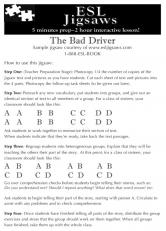ESL Jigsaws
5 Minutes Prep - 2 Hour Interactive Lesson!
Viewing entries tagged with 'Reading'
Reading on a Thrift Store Business Model
Thrift stores are becoming more popular with middle aged clothes shoppers. Seems if you don't want to wear yoga attire to work, thrift stores are some of the best sources for clothing made from a wider variety of fabrics.
Christmas Reading for Low Beginners
The Christmas story below is geared for literacy and low beginner ELL students. It is adapted from Callan’s Canadian Holidays for Low Beginner ESL, but is suitable for use in America as well. Further low beginner exercises on Christmas, with pictures, are found in that book. An audio CD and cloze exercise are also available. (For free material for mid-beginner or intermediate level, check out my blog post on Christmas from last year, here. Or why not try a jigsaw lesson for Christmas? Check out Callan's Holiday Jigsaws.)
Soft Skill: Who Picks Up the Bill?
We often think of bargaining language as confined to situations like a garage sale or to the purchase of larger items like cars or homes. One of the most common negotiations most people will engage in at some point is who will pay the bill in a restaurant. Not only are there language and soft skills specific to this situation, many cultural assumptions are thrown into the mix. Countries, as well as the cultures within them, differ in their norms about who should pick up the tab and when. Learning the related idioms and other bargaining language but not cracking this cultural code and developing the soft skills to successfully navigate this interaction can lead to social awkwardness as exemplified in the story below.
Halloween Noodles
I’ve heard some teachers say that their students were not interested in participating in Halloween. Many others feel that malls are safer locations for children to go trick or treating these days. Here’s a true story of an adult ESL student of mine from Taiwan and her first Halloween here, to illustrate my view that the neighbourhood tradition of trick or treating is a worthwhile one we should teach students about.
Teaching about Labor / Labour Day
If you are teaching ESL to immigrants or EFL to VISA students and the topic of Labor Day in the United States or Labour Day in Canada comes up, you may find that your students also celebrate a day for workers in their home countries, but that day is usually on May 1st. A national holiday in over 80 countries, May 1st is also celebrated unofficially in many more.
Teaching Food at Higher Levels
If you're like me, you like to teach your food unit during the summer when the grocery stores are full of fresh produce and farmers' markets are in full swing.
Garage Sales & Thrift Stores
It's summer and I'm back on the topic of second hand shopping. If you are teaching English to new immigrants, they may see something as they walk around their neighbourhoods at this time of year that they don't have in their home countries: garage sales. Likewise, they will likely come across thrift stores or flea markets in their neighbourhoods.
Mother's Day
Many teachers who teach English as an additional language are mothers. In the spirit of thanks to mothers everywhere, I'm sharing a couple pages from my low beginner holidays book for free, to use in your class. I hope you find them useful.


